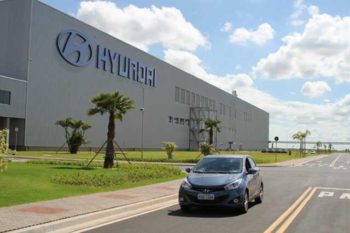South Korea’s largest auto maker, Hyundai Motor Company has announced its 2016 full year business result with its total sales down by 2.1 per cent due to recession in emerging markets and series of labour strikes.
The company sold 4.2 million units overseas and 657,526 units at home, totalling 4.86 million units worldwide.
Nigeria is Hyundai Motors’ biggest emerging market in the last five year, with the company establishing its assembly plant in the country in 2014.
Hyundai Nigeria reported dwindling sales in 2016 following the recessive economy of the country.
The company’s sales volume and operating profit declined from the same period last year “due to high production cost caused by series of labor strikes and continued economic stagnancies in emerging markets.”
Despite year-on-year decrease in sales, Hyundai Motor’s sales revenue increased 1.8 per cent to KRW 93.65 trillion (auto: KRW 72.68 trillion / finance and others: KRW 20.97 trillion) from a year earlier owing to sales increase of SUVs and GENESIS models. Operating profit fell 18.3 per cent to KRW 5.19 trillion and net profit showed a 12.1 per cent decrease to KRW 5.72 trillion, for 2016.
In the fourth quarter alone, global sales totalled 1,380,024 units while sales revenue posted KRW 24.54 trillion with operating profit of KRW 1.02 trillion. Hyundai Motor forecasts the business environment to be ever more uncertain due to continued sluggish global economy and possibility of increase in protectionist trade policies.
Nevertheless, Hyundai Motor will continue its effort to focus on strengthening competitiveness and product quality in the global automotive market. To do so, Hyundai Motor will launch variety of new cars and boost sales of SUVs, GENESIS models and eco-friendly models.
Also by continuously investing in R&D, Hyundai Motor will focus on three core future technologies Clean Mobility, Freedom in Mobility and Connected Mobility, to ensure future growth.
